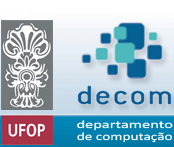Defesa de Mestrado - 03/08 - 14h - Saul Emanuel Delabrida Silva
Título: IDEAL-TRAFFIC: UM FRAMEWORK PARA CONSTRUÇAO DE SISTEMAS DE MONITORAMENTO PARA SISTEMAS DE TRANSPORTES INTELIGENTES
RESUMO: The evolution and dissemination of network communication technology and the
advanced status of embedded devices encourage the creation of solutions for monitoring
cities in various environments. Intelligent Transportation Systems (ITS) is an area that
makes use of these technologies, so that end-users can benefit from applications that
deliver information in real time. On the other hand, administrating these applications is
not a trivial task. Components may fail and invalidate an application. Usually, traffic
application architecture is centralized, fact that increases the cost of maintenance and
reduces the flexibility of reuse of resources.
There are features required on ITS such as adaptability, scalability, heterogeneity,
interoperability, openness, accessibility, and flexibility. It was not found on the
literature related work that aims to cover all of these features, although some of them
are requisites for ITS developed for use in North America and Europe.
In this work we present IDEAL-TRAFFIC: a framework based on SOA architecture
for building monitoring applications, with the ability to manage the state of the
applications. IDEAL-TRAFFIC provides a simple interface that enables system
administrators to create applications and make them available to end users.
A self-adaptation process is included in the IDEAL-TRAFFIC framework in order
to ensure the fault tolerance. For the implementation of these features, rules of the
application need to be considered and might depend upon the minimum of human
intervention, since the framework can use third part systems or legacy systems to
retrieve relevant data to continue running an application.
In this thesis, we have applied the IDEAL-TRAFFIC to two use cases to illustrate its
use for ITS. In the first use case, we have demonstrated the use of the framework in
static nodes. In the second use case, we have shown as the framework may be integrated
with vehicular networks.
Three experiments have launched. In all executions we have reproduced the first use
case. Our implementation has been done in embedded devices. In order to demonstrate
the framework accordance with ITS requirements, the creation of services using XML
SOA files, the communication among devices, the integration of the framework with
legacy system, and the scalability of the system were demonstrated. In all experiments
we have obtained the expected results, receiving the messages from devices. This fact
shows that the IDEAL-TRAFFIC is in accordance with the ITS requirements.
In the experiments launched, it was proved that the use of XML to instantiate
applications is a feasible and efficient alternative to create applications using services
available by several nodes on the network. The proposed process reduces the time of
creation of the applications.

